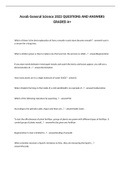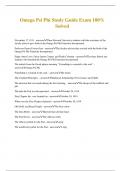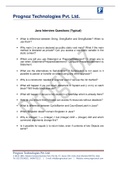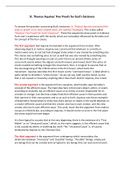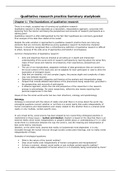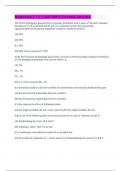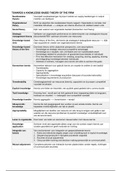Fiduciary duty: No profit rule:
Definition: Bray v Ford- A fiduciary is not entitled to make a profit
unless expressly provided
Bristol and West Building Society v Matthew- A Re Macadam- If the trustee/fiduciary acquire the profit
relationship of trust and confidence. The distinguishing as a result of his position. If the answer is yes, the no
obligation of a fiduciary is the obligation of loyalty. profit rule applies yes
Duties of fiduciary A fiduciary can use knowledge gained as a result of his
Imposes the highest standard of duty on the fiduciary position but only for the benefit of the beneficiary/trust
(Bristol case) Boardman v Phipps- A trustee will be accountable for
Two main duties: use of information and opportunities stemming from
their position as a trustee. All the profit made had to be
No conflict rule: paid back to the trust, as the profit came from the
information they had received as trustees
Bray v Ford- A person in a fiduciary position is not, McWilliam v Norton Finance- A fiduciary must not make
unless otherwise expressly provided allowed to put any secret profit, fiduciaries must account to their
himself in a position where his interest and duty conflict principal for any profit made without the principal’s
Fiduciary has strict liability for any breaches of the no- knowledge
conflict rule, rule can be breached even where Murad v Al- Suraj- Equity defines profit as including all
The fiduciary has acted in good faith the benefit which the fiduciary has received during the
The principal has suffered no loss, would have actually course of the relationship and not just the benefit which
benefited from the actions of the fiduciary and if they came directly from the particular breach of a fiduciary
would have allowed the transaction to go ahead if they duty
had been asked Regardless of whether the principal themselves was in a
Mere possibility of a conflict is sufficient even if there position to take advantage or act of the information
was no actual conflict Regardless of whether the trust actually benefitted from
the fiduciary position
No conflict has two sub- rules, self-dealing and fair-dealing
Keech v Sandford- A trustee owes a strict duty of loyalty
Self-dealing: so that there can never be the possibility of a conflict of
interest
Tito v Waddell (No 2) - Prohibits the fiduciary from Regal (Hastings) Ltd V Gulliver – As agents of the
acting for himself and the principal in the same business, directors were liable for breaching their
transaction. Cannot sell trust property to himself or to fiduciary duties without consent
sell his own property to the trust Bhullar v Bhullar – Director must avoid any possibility of
Re Boles- Normally will not binding once the a conflict of interest
relationship comes to an end The justification behind the strict rule is that it is based
Wright v Morgan- Permission to buy property can be on public policy and ensuring the moral duty of care
permitted within the trust documents owed by a fiduciary towards his principal is always
Holder v Holder – Courts relaxed the rule by stating if a fulfilled
fiduciary discharge themselves of the relationship before Some see it more as a protection against human nature
duties are attracted, they can act on a transaction as being swayed
long as they are not basing it on information gained The rule has been described as inflexible in Bray v Ford
from their position and the harsh application has been criticised in
Boardman v Phipps and in cases where there is no
Fair dealing rule:
impropriety (improper behaviour) on the part of the
Tito v Waddell – If a trustee purchases the beneficial fiduciary (Murad v Al-Suraj)
interest of any of his beneficiaries, the transaction is not
Exceptions to the rule:
voidable but can be set aside, unless the trustee can
show that he took no advantage of his position and s.28 Trustee Act 2000- Authority of a trust instrument
made full disclosure to the beneficiary S.29 Trustee Act 2000- Agreement by statute
Re Thompson’s Settlement- The transaction has to be Where full disclosure has been made to the principal
fair and honest and the beneficiary made independent and they have given their full informed
judgement in allowing the transaction Authorized by court by giving powers to a fiduciary
Acting for more than one principle: Renumeration (pay) is permitted under S.31 Trustees
Clark Boyce v Mouat – This is allowed as long as both Act 2000 and under Boardman v Phipps on a quantum
principals are aware of this fiduciary’s position and meruit payment in respect of hard work in service
consent to the conflict towards the trust
Hilton v Barker Booth- A fiduciary will not be liable if the S.175 Companies Act 2006- Company directors are
two principal’s interests come into conflict but would be bound by the non-conflict rule
if he fails to disclose confidential information concerning
one principal to another about a specific transaction Remedies:
(breach of the conflict rule)
Marks & Spencers Plc v Freshfields- When a breach has
occurred the fiduciary will be held to account for any
profit made by the other principal
Definition: Bray v Ford- A fiduciary is not entitled to make a profit
unless expressly provided
Bristol and West Building Society v Matthew- A Re Macadam- If the trustee/fiduciary acquire the profit
relationship of trust and confidence. The distinguishing as a result of his position. If the answer is yes, the no
obligation of a fiduciary is the obligation of loyalty. profit rule applies yes
Duties of fiduciary A fiduciary can use knowledge gained as a result of his
Imposes the highest standard of duty on the fiduciary position but only for the benefit of the beneficiary/trust
(Bristol case) Boardman v Phipps- A trustee will be accountable for
Two main duties: use of information and opportunities stemming from
their position as a trustee. All the profit made had to be
No conflict rule: paid back to the trust, as the profit came from the
information they had received as trustees
Bray v Ford- A person in a fiduciary position is not, McWilliam v Norton Finance- A fiduciary must not make
unless otherwise expressly provided allowed to put any secret profit, fiduciaries must account to their
himself in a position where his interest and duty conflict principal for any profit made without the principal’s
Fiduciary has strict liability for any breaches of the no- knowledge
conflict rule, rule can be breached even where Murad v Al- Suraj- Equity defines profit as including all
The fiduciary has acted in good faith the benefit which the fiduciary has received during the
The principal has suffered no loss, would have actually course of the relationship and not just the benefit which
benefited from the actions of the fiduciary and if they came directly from the particular breach of a fiduciary
would have allowed the transaction to go ahead if they duty
had been asked Regardless of whether the principal themselves was in a
Mere possibility of a conflict is sufficient even if there position to take advantage or act of the information
was no actual conflict Regardless of whether the trust actually benefitted from
the fiduciary position
No conflict has two sub- rules, self-dealing and fair-dealing
Keech v Sandford- A trustee owes a strict duty of loyalty
Self-dealing: so that there can never be the possibility of a conflict of
interest
Tito v Waddell (No 2) - Prohibits the fiduciary from Regal (Hastings) Ltd V Gulliver – As agents of the
acting for himself and the principal in the same business, directors were liable for breaching their
transaction. Cannot sell trust property to himself or to fiduciary duties without consent
sell his own property to the trust Bhullar v Bhullar – Director must avoid any possibility of
Re Boles- Normally will not binding once the a conflict of interest
relationship comes to an end The justification behind the strict rule is that it is based
Wright v Morgan- Permission to buy property can be on public policy and ensuring the moral duty of care
permitted within the trust documents owed by a fiduciary towards his principal is always
Holder v Holder – Courts relaxed the rule by stating if a fulfilled
fiduciary discharge themselves of the relationship before Some see it more as a protection against human nature
duties are attracted, they can act on a transaction as being swayed
long as they are not basing it on information gained The rule has been described as inflexible in Bray v Ford
from their position and the harsh application has been criticised in
Boardman v Phipps and in cases where there is no
Fair dealing rule:
impropriety (improper behaviour) on the part of the
Tito v Waddell – If a trustee purchases the beneficial fiduciary (Murad v Al-Suraj)
interest of any of his beneficiaries, the transaction is not
Exceptions to the rule:
voidable but can be set aside, unless the trustee can
show that he took no advantage of his position and s.28 Trustee Act 2000- Authority of a trust instrument
made full disclosure to the beneficiary S.29 Trustee Act 2000- Agreement by statute
Re Thompson’s Settlement- The transaction has to be Where full disclosure has been made to the principal
fair and honest and the beneficiary made independent and they have given their full informed
judgement in allowing the transaction Authorized by court by giving powers to a fiduciary
Acting for more than one principle: Renumeration (pay) is permitted under S.31 Trustees
Clark Boyce v Mouat – This is allowed as long as both Act 2000 and under Boardman v Phipps on a quantum
principals are aware of this fiduciary’s position and meruit payment in respect of hard work in service
consent to the conflict towards the trust
Hilton v Barker Booth- A fiduciary will not be liable if the S.175 Companies Act 2006- Company directors are
two principal’s interests come into conflict but would be bound by the non-conflict rule
if he fails to disclose confidential information concerning
one principal to another about a specific transaction Remedies:
(breach of the conflict rule)
Marks & Spencers Plc v Freshfields- When a breach has
occurred the fiduciary will be held to account for any
profit made by the other principal


